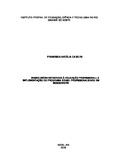Ensino médio integrado à educação profissional: a implementação do Programa Brasil Profissionalizado em Mossoró/RN

Visualizar/
Data
2016-06-24Autor
Silva, Francisca Natália
http://lattes.cnpq.br/8797788504989445
Metadado
Mostrar registro completoResumo
This work has the objective of analyzing the implementation of the program called Professionalized Brazil, in Mossoro/RN, as a public policy of articulation between Secondary School and professional education in two state schools from Mossoro’s state education network. In this sense, we are backed up by the methodological concept of assessment through implementation analysis which is guided by the following questions: Within what context was the program created? What actions and measures were required to facilitate the implementation of this program in the target schools? What are the material and pedagogical conditions offered in the implementation of the proposal? How are the monitoring and assessment of the implementation of the proposal carried out? How have the secondary school and the professional education been articulated in the implementation of this program in the state schools of Mossoro? In order to answer those questions, the methodological approach was organized in three stages: literature review, documental research and empirical research. The program is grounded by the need to expand the supply of professional education in order to include young people in the economic and social activities. But the systematic analysis of the categories (implemented policies for the articulation of the secondary school and the professional education, actions and measures to implement the program, material and pedagogical conditions, monitoring and assessment and possibilities of integrating the secondary school to the professional education in the implementation of the program) point to results that indicate the following: some objectives were partially achieved, as an example, the one that aims at expanding the service offered and improving the quality of the supply as to the physical space of schools, either by constructing new ones or reforming the existing units. In the empirical field, in the Jeronimo Rosado State School, the implementation of the program focused primarily in reform actions and expansion of the school's physical structure, yet by the end of 2015 there were not any new classes of the System and Gas Course implemented. On the other hand, at the Professor Abel Freire Coelho State School, the Occupational Safety Course is in operation, although it presents some difficulties as lack of professionals to teach some of the technical disciplines, lack of supply in the continuing education courses and of specific teaching-learning materials to guide the developed practices. Due to that, the program can be considered as a policy, aimed at training young people in
Brazil, doomed to discontinuity in the near future, by the conditions presented and discussed in this work.



